Expert Support for Creating A Successful Relapse Prevention Plan
A rock-solid relapse prevention plan is a really pivotal part of the recovery process.
After putting in weeks of hard work, including medical detox and individual or group therapy, establishing this aftercare plan is crucial to continuing your long-term recovery journey successfully.
Our relapse prevention worksheets can be one tool to help keep focused on making permanent changes.
Ingrained Recovery helps clients work on their addictive behaviors and mental health challenges. We address each client’s physical, emotional, and mental well-being throughout their program and provide them with tools to build a brighter future after completing treatment.
However, we also know that the intense cravings don’t magically disappear when someone graduates from a substance use disorder treatment program. Daily life outside of the protective space of the treatment center is fraught with pitfalls.
That’s where our relapse prevention worksheets come in. Keep reading to learn more about how we prepare our clients for success in sobriety, and download our resources to support your recovery!
Get Accredited Treatment Programs at Ingrained Recovery
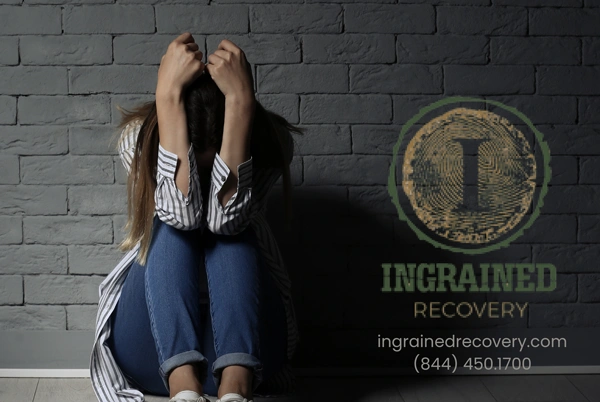
Our Relapse Prevention Worksheet Resources
Taking a moment to fill in a relapse prevention plan or exercise is important in creating a structured pause between the impulse to use drugs or drink alcohol and acting on the urge. When you reflect on the real-life consequences of using again, you may start to think differently and avoid the slip-up.
We’re providing three worksheets to help you reflect on your emotional state and explore alternatives to using again. Please print these to have handy the next time your emotions threaten your sobriety.
As you complete these worksheets, stay true to yourself. Remember that these are a tool of self-compassion and self-growth. Be as honest and compassionate with yourself as you would be with a close friend who’s struggling.
Nobody else will need to see these worksheets, unless you make the call to share them with a counselor or a trusted friend.
Get Proven Detox and Rehab Options at Ingrained
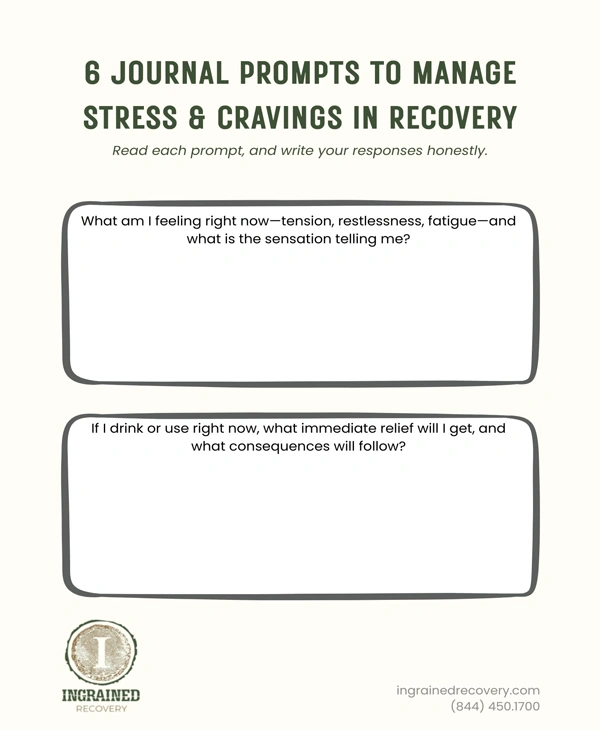
Maintaining Motivation: Journaling Prompts and Reflection Tools
Our journal prompts are perfect for managing cravings in the moment. They provide guidance, helping you to pause, externalize the craving, and choose a coping skill instead of acting on the impulse to relapse.
Here’s a look at each of the prompts and a brief explanation of why they can help you stop a craving before an actual relapse occurs:
1: What am I feeling right now—tension, restlessness, fatigue—and what is the sensation telling me?
Gaining the ability to recognize physical sensations can help separate emotions from actual physical needs. This awareness helps you choose self-care over using substances to alleviate the stress that triggers you.
2: If I drink or use right now, what immediate relief will I get, and what consequences will follow?
When you weigh the short-term impact of engaging in addictive behaviors against the long-term consequences, you make better decisions.
This answer could become a powerful reminder that temporary comfort isn’t worth caving into the siren call of addiction.
3: What coping strategies or activities can I do for the next 10 minutes to reduce stress?
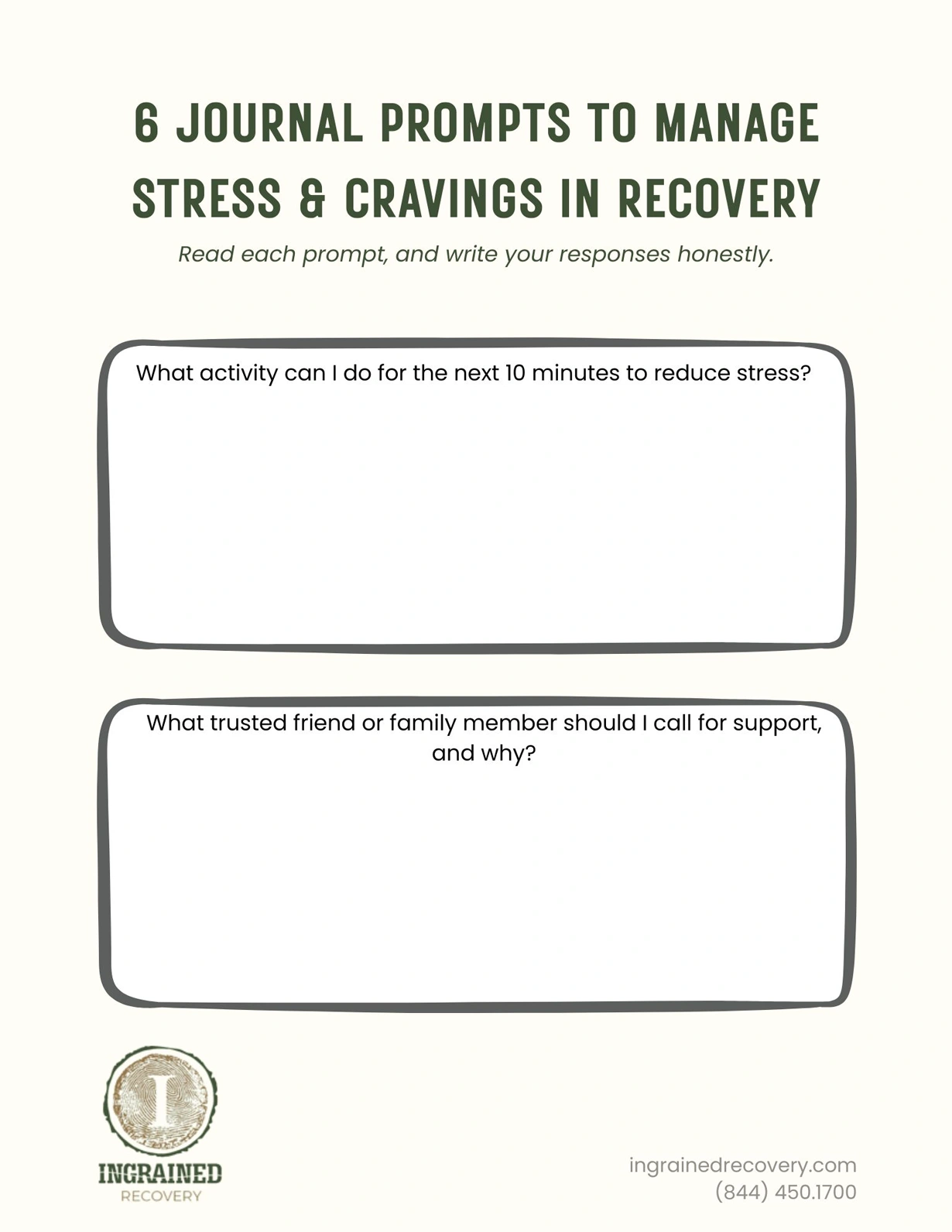
This question helps you recall the healthy lifestyle activities and interests that contribute to maintaining sobriety. Once you remember these, you can take the time to re-engage.
Some people choose mindfulness meditation, deep breathing, or taking a short, brisk walk. Choose the relaxing activity that will help you.
4: What trusted friend or family member should I call for support, and why?
Developing a list of “safe people” is an essential task in every aftercare plan. It’s powerful because connecting with someone to discuss your addiction creates a sense of accountability.
Recall that list and note some names of friends, family members, or loved ones you can reach out to for judgment-free support. Sharing with another person when you struggle with cravings can help you feel less lonely in your struggle.
5: What will tomorrow look like if I avoid a relapse - will I feel proud or relieved when it passes?
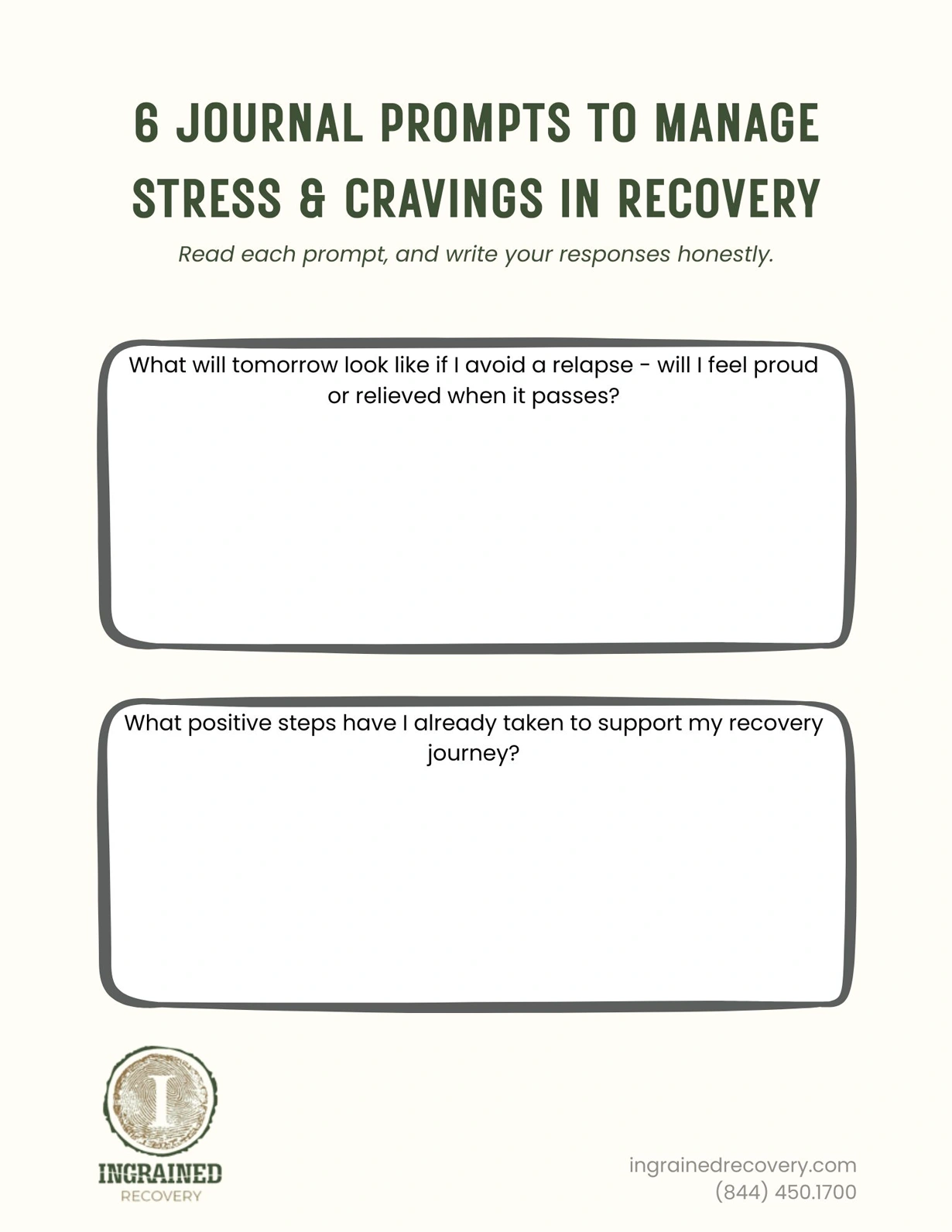
When you visualize tomorrow, you strengthen your motivation to stay clean and sober. You realize without self-judgment that you are worth the investment of time, effort, and energy, and that your sobriety is too precious to waste.
6: What positive steps have I already taken to support my recovery journey?
Reflecting on past successful steps in your recovery helps you shift away from those urges and regain a sense of self-confidence. You’re no longer willing to let external events trigger use.
Our Approach to Opioid Addiction Differs from Methadone Programs in Atlanta
At Ingrained Recovery, we focus on whole-person healing—not just craving and pain management. Methadone on its own can help with withdrawal symptoms, but it’s not a good fit for everyone.
We prefer Suboxone (buprenorphine + naloxone), Subutex, and naltrexone, each effective in treating addiction. Clients also receive counseling and relapse prevention education, ensuring an enriching journey.
Craving Reduction Activity: Cost–Benefit Analysis Worksheet
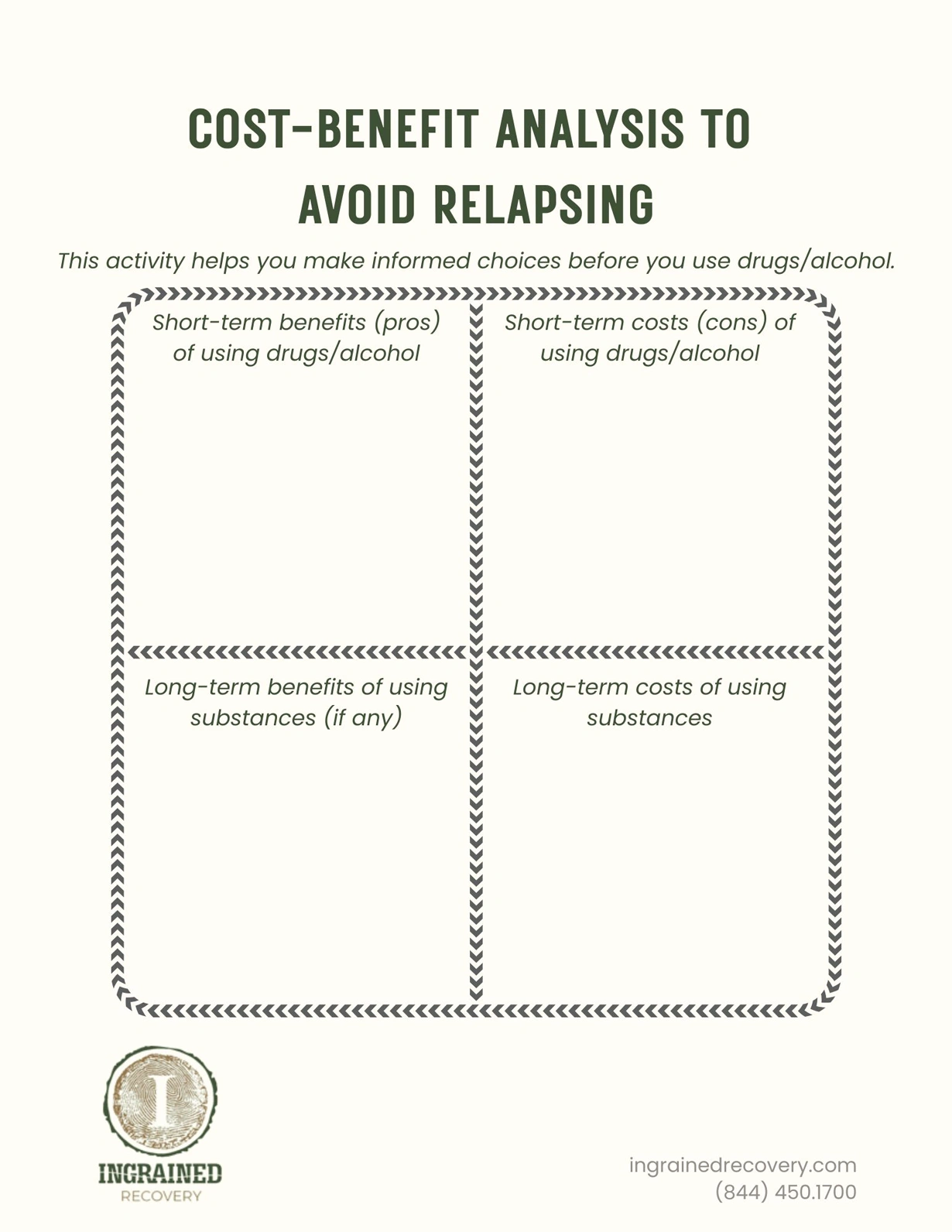
The Cost-Benefit Analysis Worksheet can help you pause, consider the short- and long-term consequences of using drugs or alcohol as core part of your relapse prevention plan.
Writing these down makes the potential outcomes more concrete, which helps you overcome impulsive decisions and use logic to make healthy choices.
Some may write down short-term benefits, such as instant relief from cravings, they enjoy the high, or it helps them deal with stress. Frequent short-term costs are undoing the work of recovery, losing trust they’ve rebuilt in relationships, or financial setbacks.
When trying to think of long-term benefits of engaging in drug or alcohol use, many can’t think of a single thing. But when considering long-term costs, people often list such consequences and loss of driving privileges, fines or jail time, broken relationships, and losing a career.
When these are put on paper, the evidence becomes practically indisputable, underscoring the importance of maintaining a healthier lifestyle.
Using Affirmations to Support Emotional Healing
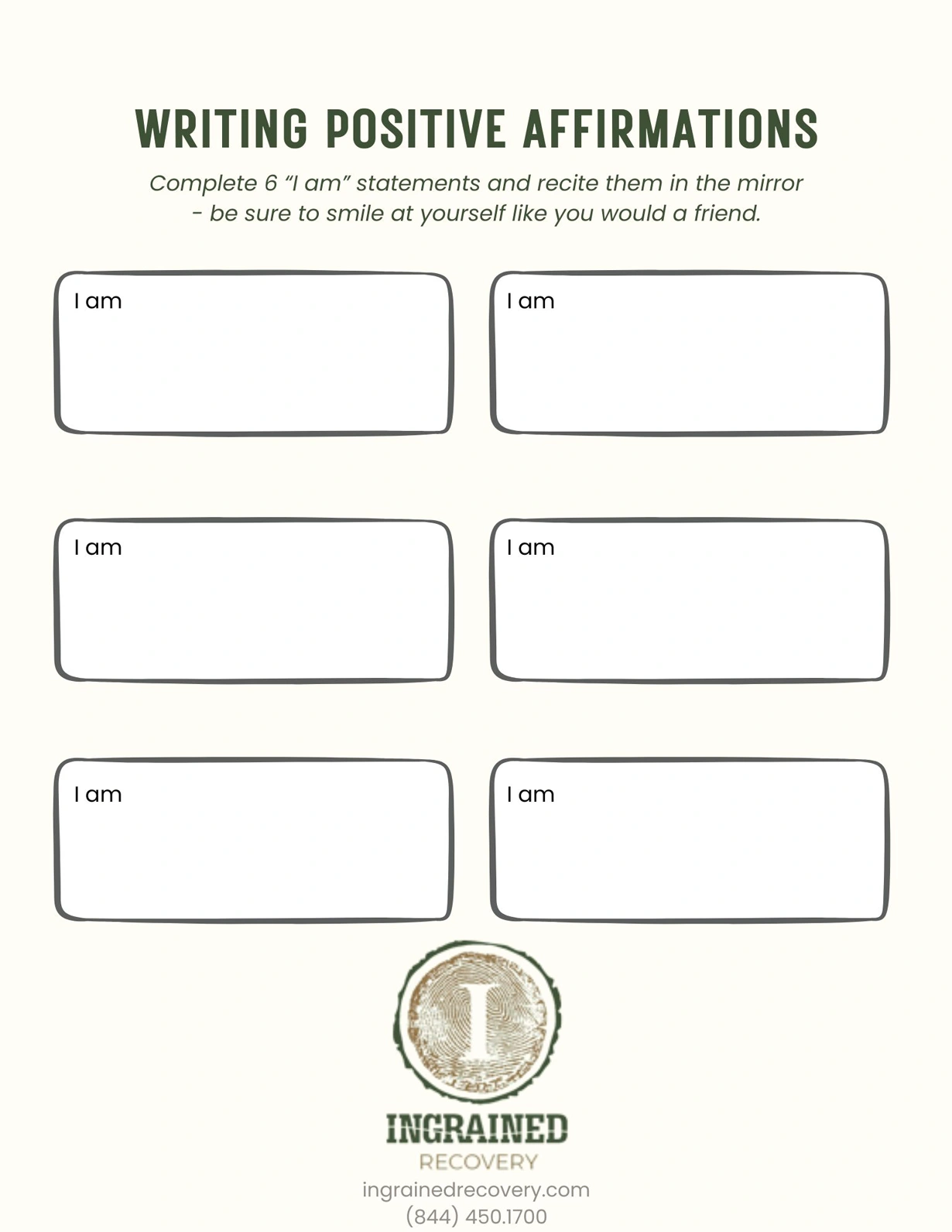
Writing affirmations helps you restore and reinforce self-confidence when you feel it slipping away. This sheet helps you replace self-criticism or doubt with internal motivation. This addition to your relapse prevention plan can help address your inner critic and silence any shame lingering from the past.
Self-affirming statements usually start with “I am,” followed by a positive attribute.
Some frequent examples of “I am” affirmations are the following:
- I am strong.
- I am able to learn new behaviors.
- I am capable.
- I am committed to making lasting change.
- I am loved.
- I am worthy of self-love.
- I am deserving of wellness.
Each is an emphatic, powerful statement. Some people read these aloud or note them in the margins of their journals. However, many find it very empowering to look in a mirror, smile as though speaking to a loved one, and repeat them as they look at their reflection.
There’s no right or wrong way of including affirmations in your daily routine. Do whatever feels natural to you.
What Are the Reported Relapse Rates?
Not everyone who relapses self-reports or seeks help; that poses a challenge in identifying a precise number… Though mental health experts at the National Institute on Drug Abuse (NIDA) have published an estimated rate of 40-60%.
This number is not intended to scare you, but to help you see the connection between negative behavioral patterns and actively working to prevent relapse.
In addition to the statistics, NIDA also states that a setback doesn’t mean failure; instead, it means that the person needs additional tools to help reshape their substance abuse behaviors.
They also remind readers that a substance use disorder is a chronic illness, like heart disease or asthma; it’s not something you decided to do.
This makes crafting a reliable relapse prevention plan even more essential!
Developing Coping Skills to Prevent Relapse

Besides the pen-and-paper worksheets we’ve shared, several other activities can help you stay on the path to recovering from addiction. Here are a few more things our licensed therapists recommend:
Attending Support Groups
Alcoholics Anonymous (AA), Narcotics Anonymous (NA), and SMART Recovery are led by people who understand your experiences. In the support group setting, peers share stories about their struggles, seek solutions, and hold each other accountable on a weekly basis.
The encouragement you receive from attending peer support groups is invaluable, especially in the early days after treatment.
Practicing Self-compassion
It can feel awkward to show yourself the same compassion you might show a friend who struggles with a problem. But self-kindness helps reduce stress, shame, and stigma about addiction. So use kinder self-talk and remind yourself that healing and restoring family trust and friendships takes time.
Volunteering or Community Service
Serving others is an excellent way to build a more meaningful life after treatment. Helping others reduces isolation that can lead to self-doubt, uplifts your mood, and reminds you of all the progress that came from your hard work.
You might mentor others who struggle, serve food at a soup kitchen, or help clean up litter at a park – each tiny act helps you become more intentional and purposeful.
Physical Exercise or Sports
Participating in physical activities, either alone or as part of an organized recreational league, can help you continue to regain both mental and physical strength.
Research has repeatedly proven that exercise helps release endorphins, which make you feel good; they’re great for reducing stress and improving sleep quality. These are important protective factors that help prevent relapse.
Setting Boundaries within Relationships
It’s okay to say “no” to others, especially when you feel unsafe. Setting healthy boundaries with your loved ones, romantic partners, and friends can be a valuable way to protect your sobriety. You get to decide which behaviors support your wellness goals and which threaten them.
So feel free to avoid the things that could trigger a relapse and say yes only to things that support your newfound freedom from drugs and alcohol. These aren’t “walls,” but guidelines that help you uphold your commitment to better well-being.
Personal Growth as a Component of Relapse Prevention Planning
Making a full recovery means more than abstinence from substance use. Instead, it means rediscovering who you are and the values that matter most to you.
While in recovery, you may decide to explore new creative interests, go back to school, change careers, or pursue new relationships. Every new experience helps you build a more purposeful, happier life that will continue to support your new sober lifestyle.
Our Professional Treatment Setting at Ingrained Recovery

If you have sought long-term recovery on your own but have been unable to maintain it, know that it’s not your fault. Your addictive behaviors are the result of a chronic condition.
Like other chronic illnesses, substance use disorders are treatable and can be effectively managed.
Ingrained provides evidence-based treatment plans to help you achieve and maintain a clean and sober life. Some recovery process strategies you’d find at our rehab center include the following:
- Medical detox to manage sickness and intense cravings in the first days away from substances
- Medication management to optimize all prescriptions
- Dual diagnosis treatment for any person with an underlying mental health condition
- Medication-assisted treatment (MAT) to safely stop alcohol or opioid addiction
- Working individually with a licensed therapist
- Family and group therapy
- Stress management and coping skills
- Equine therapy, music and art therapy, or exercise for a more holistic experience
- Nutritional counseling to restore physical strength
- Aftercare planning and help to craft a comprehensive relapse prevention plan to help overcome challenges to sobriety after graduating our program.
We provide a structured framework to support personal growth in ways you may never have imagined, set against the stunning backdrop of our 50-acre ranch-style campus.
Up To 100% of Rehab Costs Covered By Insurance
Call Ingrained Today for Effective Recovery Support Options
If you are ready to start the recovery journey, we are here to help. We accept self-pay clients and work with most major insurance carriers – just connect with our admissions team for a confidential, stress-free insurance review.
Help is within your reach.
Call Ingrained Recovery today to learn how we can help you break free from substance use disorders and any underlying mental health problems. All calls are confidential, so please reach out now!
